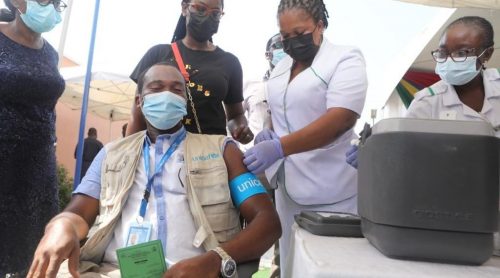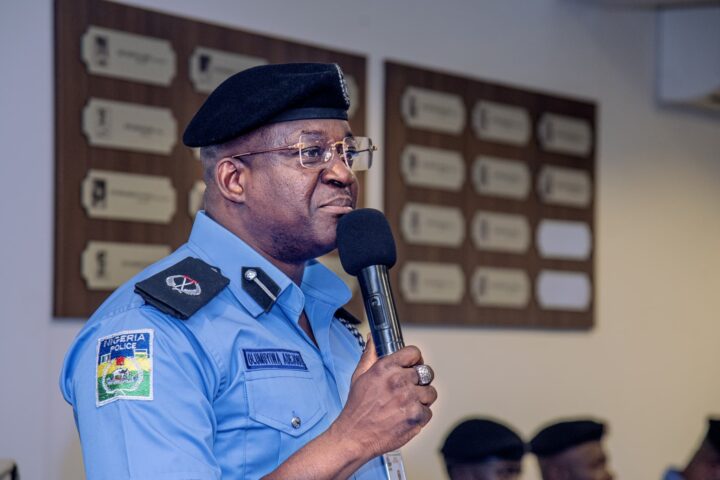The National Primary Healthcare Development Agency (NPHCDA), has vaccinated 5,770,899 eligible persons with the first dose of the COVID-19 vaccination while 3,146,885 have taken the second dose (fully vaccinated).
The Director, Planning Research and Statistics, NPHCDA, Abdullahi Garba, disclosed this on Monday in Abuja, at the Ministerial Press Briefing update on COVID-19 Response and Development in the Health Sector.
Mr Garuba added that these figures were achieved as of November 7, 2021, in the 36 states and the FCT.
He noted that there were over eight million doses of vaccines in the country at the moment, but the country was still expecting more doses.
He noted that to achieve herd immunity against the infection, Nigeria had set an ambitious goal of vaccinating 40 percent of its over 200 million population before the end of 2021, and 70 percent by the end of 2022.
“To achieve this, the vaccine roll-out was scheduled to be in four phases, starting with health workers, frontline workers, COVID-19 rapid response team, amongst others.
“The second phase has commenced and it’s capturing older adults, aged 50 years and above, and those aged between 18 and 49 years of age,” he explained.
Elsie Ilori, Director of Disease Surveillance Department, Nigeria Centre for Disease Control (NCDC), while giving an update on Nigeria’s COVID-19 situation, said that while progress had been made in response to the ongoing pandemic with the fact-paced development of diagnostic, therapeutic, and vaccines globally, variants of concern with increased transmissibility pose a threat.
Mrs Ilori said that the pandemic continues to play out differently across countries worldwide.
Notably, Africa had seen fewer severe cases and deaths but despite limitations of testing has experienced similar transmission of the SARS-CoV-2 virus in its population.
According to her, “Regardless of the differing patterns of disease and deaths seen, the risk of the emergence of SARS-CoV-2 variants capable of evading human immune responses is a global concern”.
She added that the Delta variant remains the dominant variant globally adding that, alongside existing safety measures, widespread vaccination was providing a means for the world to exit this pandemic.
“While some countries are achieving set goals for population vaccination (South Korea), including using vaccine mandates, others are easing back on restrictions (Melbourne) and some are contemplating preserving existing restrictions for only the unvaccinated (Austria).
“Many countries in the global north have introduced vaccine booster doses, and have approved the use of COVID-19 vaccines for children aged 5 to 11 years,” she added.
The director noted as much as it seems like Nigerians have moved on from COVID-19, it was still in existence, and people are still becoming infected and sadly, dying.
She noted that despite the differences in the disease pattern across countries, Nigerians have the same patterns of risk for the elderly, those with other diseases e.g., hypertension and diabetes, the immunosuppressed, etc as seen elsewhere.
“It remains essential to ensure hand and respiratory hygiene, physical distancing, facemask wearing, and receiving the full dose of COVID-19 vaccine available.
“We have continued to respond to the pandemic and navigate these terrains by planning strategies on how to continue to live with COVID-19. A return to normalcy will be ensured by high levels of testing to ensure complete surveillance including tracking of variants of interest and concern and high levels of vaccination,” she explained.
She said that testing remains core to the response, with the rollout of rapid diagnostic testing continuing across the country.
“Community health workers are being trained on active contact tracing in states and focus is being placed on contacting silent states which do not submit reports on cases, deaths, and more.
“With regards to infection, prevention, and control (IPC), health facilities are on the receiving end of training sessions on IPC,” she explained.
According to her, “The Emergency Operations Centre remains active, weekly coordinating the response in the Incident Coordination Centre with all pillars represented and partners contributing also travel restrictions.”
“On Oct. 25, revised travel restrictions were released and took effect. Key changes to the protocols include the removal of travelers from Brazil, Turkey, and South Africa from the list of restricted countries.
“In addition, key highlights are that: negative COVID-19 PCR test results should not be conducted more than 72 hours before boarding flights for travel.
“There is no longer self-isolation as a requirement for fully vaccinated inbound passengers, however, there must be a COVID-19 PCR test done on Day 2 of arrival.
“Seven-day self-isolation is mandatory for unvaccinated and partially-vaccinated individuals in addition to COVID-19 PCR tests on days 2 and 7 after arrival.
“Additionally, people arriving on official/business trips seven days must be fully vaccinated, test negative 72 hours before boarding, and conduct a PCR test within day 2 of arrival,” she explained.
She added that the ravel portal was undergoing revisions to improve it and it was hoped that the challenges of the past would become history on completion of the process.
Safety Measures
Meanwhile, The Minister of Health, Osagie Ehanire, called on Nigerians to take action to protect the vulnerable by practicing safety measures and ensuring they are vaccinated if they are eligible.
“It is strongly recommended you get vaccinated against COVID-19 to stop the spread of the virus. When you get vaccinated, you protect yourself, your family, friends, and community against the disease,” Ehanire urged.
The minister noted that all the brands of vaccines used in the country were safe and able to deliver protection against COVID-19 for any eligible person who was vaccinated.
(NAN)

 BIG STORY4 days ago
BIG STORY4 days ago
 BIG STORY4 days ago
BIG STORY4 days ago
 BIG STORY5 days ago
BIG STORY5 days ago
 BIG STORY5 days ago
BIG STORY5 days ago
 BIG STORY4 days ago
BIG STORY4 days ago
 BIG STORY3 days ago
BIG STORY3 days ago
 BIG STORY3 days ago
BIG STORY3 days ago
 BIG STORY3 days ago
BIG STORY3 days ago
























